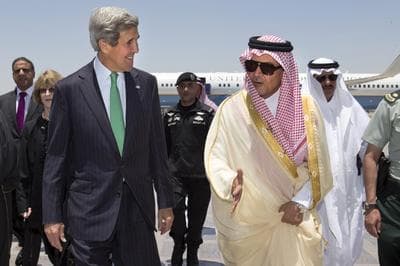Advertisement
Saudi Arabia, Iran And A Region In Flux
ResumeSaudi Arabia, Iran , and the new geo-political calculus of the Middle East, with America awkwardly in the middle.

Ever since FDR famously sailed into the Suez Canal to meet with Saudi King Ibn Saud in 1945 on the American destroyer the USS Quincy, the United States and Saudi Arabia have been deep strategic partners in the Middle East. Plenty of stresses, as the US allied with Israel and the Saudis flexed their massive oil power and exported Wahabi Islam. But the Saudi monarchy had also been an American bedrock in the region. Now the talk is of potential crackup in the partnership. That’s big. Up next On Point: Saudi fury as the US charts a new course in the Middle East.
-- Tom Ashbrook
Guests
David Ignatius, associate editor and columnist for The Washington Post. (@IgnatiusPost)
Stephen Kinzer, professor on International Relations at Boston University and a former New York Times correspondent. Author of "The Brothers: John Foster Dulles, Allen Dulles and Their Secret World War" and "Reset: Iran, Turkey and America's Future." (@StephenKinzer)
Dr. Abel Aziz Aluwaisheg, Assistant Secretary General for Negotiations and Strategic Dialogue at the Gulf Cooperation Council. (@abuhamad1)
Dan Drezner, professor of international politics at the Fletcher School of Law and Diplomacy at Tufts University, columnist at Foreign Policy Magazine and senior editor at The National Interest. (@DanDrezner)
From Tom's Reading List
Arab News: Saudi move highlights need for UN Security Council reforms — "The timing of the Saudi decision on Friday appeared to be related in particular to the failure of the UNSC to stop the carnage perpetrated by the Syria regime. Over the past 30 months, the Syrian regime has killed over (100,000) of its own people, while forcing seven million Syrians to be either refugees outside their country, or displaced inside it. UN human rights agencies and special commissions have documented crimes committed by the Syria regime, including mass killings, torture, rape, collective punishment and wholesale destruction of towns and neighborhoods. They have also named key officials who are believed to be behind crimes against humanity committed in Syria."
Foreign Policy: On Syria, You Say Bureaucratic Politics, I Say Realism — Let's Call the Whole Thing Off -- "Clearly, a lack of consensus among Obama's top foreign policymakers buttressed his own stated reluctance to get too deeply involved in Syria. That said, the policymakers with the most influence over the president were articulating a rationale for why continued conflict might not be a bad thing."
The Guardian: New President Hassan Rouhani make the unimaginable imaginable for Iran — "Finding a way to bring Iran back into the world's mainstream will be Rouhani's principal challenge. His power is limited, though in the fluid world of Iranian politics, he is likely to accumulate more. His adversaries, most notably supporters of Prime Minister Benjamin Netanyahu in Israel and the United States, ridicule him as a puppet of repressive mullahs."
This program aired on October 28, 2013.